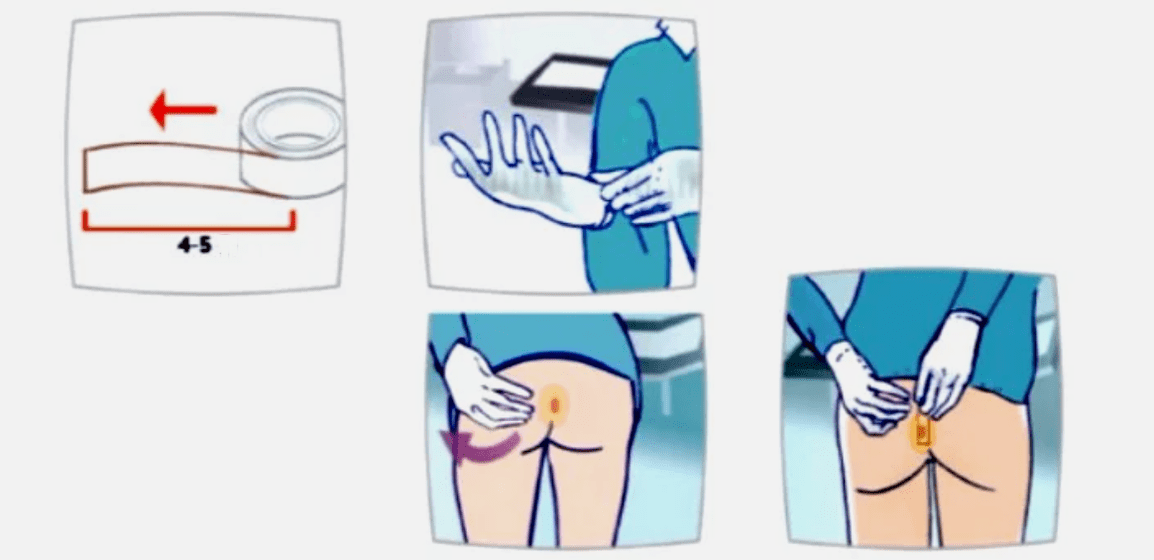
One of the well -known quotes: "In reality, parasites killed much more people than all wars in history."Surprising as a simple, sometimes unicellular creature, it is possible to disrupt the work of a large organism.People did not remain in debt.Methods have been developed that allow you to identify a parasitic invasion in the early stages and start treatment in a timely manner.Analyzes for parasites in adults can be passed both in a regular state hospital and in the laboratory of private clinics.
Who are parasites and how to identify them
Parasites are a numerous group of organisms capable of existence only due to the resources of the owner.They cannot live on their own.Parasites in the human body are fixed on the skin (bugs, ticks), in the gastrointestinal tract (ascarides, pinworms).In the intestine, the most favorable environment for the vital activity of the parasite.There are also creatures that live in the lymph vessels (filiria), on the mucous membranes of internal organs (trematoda).To gain a foothold in the body of the host, worms and protozoa use suction cups, hooks, clothespins, chitin plates or hard hairs.
It is possible to determine the presence of parasites in the human body and their colony, using the methods of modern laboratory diagnostics.What tests should be taken for parasites to the adult:
- Histological study of feces.
- Serological studies (blood tests): immunosorbent analysis (ELISU), indirect hemagglutination reaction (RNG), immunofluorescence reaction (reef or kuns method), complint binding reaction.
- PCR analysis.
Often the diagnosis is difficult, because not all parasitoses have characteristic clinical manifestations, and not all methods are equally sensitive.What is the name of the analysis that needs to be taken, the attending physician will say.It is often recommended to take a comprehensive analysis for parasites.
What is the danger of parasites
Parasitic invasions greatly deplete human immunity.Immunity is one of the components of the regulatory system of the body.With immunodeficiency:
Be careful
According to statistics, more than 1 billion people are infected with parasites.You may not even suspect that you have become a victim of parasites.
It is easy to determine the presence of parasites in the body by one symptom - an unpleasant odor from the mouth.Ask loved ones if you have a smell of your mouth in the morning (before brushing your teeth).If so, with a probability of 99% you are infected with parasites.
Infection with parasites leads to neurosis, rapid fatigue, sharp changes in moods, more serious diseases begin in further.
In menParasites cause: prostatitis, impotence, adenoma, cystitis, sand, kidney stones and bladder.
In women: pain and inflammation of the ovary.Fibroma, myoma, fibrous-acid mastopathy, inflammation of the adrenal glands, bladder and kidneys are developing.As well as heart and cancer.
We immediately want to warn that you do not need to run to the pharmacy and buy expensive medicines, which, according to the pharmacists, will etch all parasites.Most drugs are extremely ineffective, in addition, they cause great harm to the body:
- risk of virus infection increases;
- the level of antioxidant and anti -cancer protection is reduced;
- There is a violation of vascular permeability and malfunctions in hematopoiesis.
Parasites can cause serious allergic reactions.
Helminants also have a direct damaging effect.They are attached to the internal organs with sharp hooks or plates, mechanically damaging the mucous membranes.The normal work of the affected body is violated.
Helminth activities harm the body at the molecular level.The rate of insulin synthesis, growth factor and collagen is reduced.This leads to a slowdown in growth and physical development processes.The absorption in the small intestine also decreases.Parasitic infections are characterized by small chronic blood loss from affected organs.
Recent scientific studies have shown, worms in the intestines distinguish specific toxins that suppress the activities of cytokines.These are information molecules that regulate intercellular contacts.They give the cell information about the external environment.If there is free space, then the cell can begin division.Blocking the work of cytokines can lead to the formation of a tumor.Cytokines also provide an agreed reaction of the immune, nervous and hormonal systems to the action of foreign agents.
Reasons for the delivery of analysis for parasites
When infected with individual parasites, a person may not feel any symptoms.But over time, the number of helminths increases, and the infection begins to manifest itself.It is necessary to take tests for parasites if there are symptoms such as abdominal pain of different localization that can occur spontaneously or on palpation.
The nature of the symptoms depends on the type of parasites.Itching and burning in the anal region cause pinworms.Askarides provoke severe allergic reactions, as well as cramping abdominal pain.Lambia, echinococci and bicondumure affect the liver.They are often the cause of the obstruction of the biliary tract and cholestasis (stagnation of bile), inflammation of the gall bladder.Light feces with drops of fat are one of the main signs of the pathology of the liver and pancreas.The symptom of parasitic effect on the liver and gall bladder is pain in the right hypochondrium.
If several of the listed symptoms appear, it is necessary to go to the hospital in order to identify parasites in the body in time.It is necessary to take regular preventive tests for parasites for children, people who live or work with animals.If raw, jerky, slightly salted meat, lard or fish are regularly consumed for food, the risk of infection is very high.In this case, it is also necessary to regularly be checked to identify parasites.
Detailed coprogram
A histological coprogram is a microscopic study of feces to detect eggs, larvae or traces of the vital activity of adults of parasites.Detailed analysis of feces is a universal method for detecting intestinal helminths (pinworms, ascaris, ankylost, plum -head).
How to take a fecal analysis.You need to buy a special sterile container in a pharmacy.It is filled with fecal masses by a third of volume.Before defecation, it is necessary to urinate so that the urine does not fall into the sample.The lid of the filled container is tightly twisted.
Biomaterial can be stored in the refrigerator for no more than 8 hours, after this time it is no longer suitable for research.A week before the analysis, you need to stop taking any drugs, exclude fried and fatty dishes.On the eve of the fence of the material, you can not put rectal candles, drink a laxative or make enemas.
The main drawback of the coprogram is low efficiency (about 35%).Helminants do not lay eggs every day.Therefore, the analysis of feces for parasites must be taken three times with an interval of 3-5 days.Disordered results can usually be obtained 4-6 days after delivery.
Scraping to parasites

A scraping or smear from the area of the anus is taken only for the diagnosis of enterobiosis (pinworms).The smear is taken in two ways:
- using a special spatula or cotton wool;
- With the help of a sticky tape.
A spatula can be bought at a pharmacy.The smear is removed around the anus and crotch.The procedure can be carried out at home or in a clinic.The fence of the material is carried out in the morning, before that you can not wash or douch.If the scraping was made at home, then the spatula must be placed in a sealed container or bag, and on the same day delivered to the laboratory.The result of the analysis can be obtained tomorrow.To make an accurate diagnosis, analysis for parasites must be submitted several times in a row.
Blood tests
You can donate blood on parasites.This is a universal object of laboratory research.By changing its composition, one can judge the pathologies within the body.How to identify parasites, examining blood, what tests are donated?An immunosorbent analysis is carried out for antibodies and antigens, a reaction of indirect hemagglutination and immunofluorescence.In a general blood test, in the presence of parasitic infection in the body, the level of eosinophils is increased.
ELISA
Immunoformal analysis (ELISA) allows you to determine the presence and concentration of immunoglobulin (antibodies) in the blood, which are produced in response to the invasion of foreign agents (antigens).IFA analysis is a highly sensitive method that allows you to identify antigens even in small quantities.With its help, you can accurately determine the type of parasites, the number of a colony, as well as the stage of development of the process.
ELISA for parasites in the human body is deciphered according to five classes of antibodies.To diagnose helminthic invasion, there are enough immunoglobulins of only three classes:
- Immunoglobulin M (IGM).They are produced 4 days after infection, present in the blood for 6 weeks.The presence of IGM indicates the intensive reproduction of foreign agents.
- Immunoglobulins G (IgG).They enter the bloodstream on 20-28 days after infection, may be present in plasma for several months or years.The presence of IgG indicates infection.
- Immunoglobulin A (Iga).They are produced two weeks after the penetration of pathogenic organisms, disappear after 5-8 weeks.The presence of IGA indicates an infection or that the body cleans itself.
A blood sample for ELISA is passed in the morning on an empty stomach.
RNA
The reaction of indirect hemagglutination is the most specific and sensitive of all serological methods.The reaction of red blood cells to the action of a variety of antigens is being studied.Evaluate the nature and intensity of the precipitation of red blood cells.With a high and sharply intense reaction, the bottom of the tube is covered with glued red blood cells.The results of the analysis are deciphered by the attending physician.
RNIF
An indirect reaction of immunofluorescence allows you to identify a complex of antigen-antibodulation.For this, a blood sample is treated with a special serum against immunoglobulins, which contains fluorochrome in the composition.After that, the sample is studied under a fluorescent microscope.
The results are evaluated by the intensity of the yellow-green glow.High titers indicate the presence of helminthic invasion.The attending physician is engaged in the decoding of the analysis results.
RSK
An antibody with the corresponding antigen is formed by an immune complex that can contact a complement system.This is based on the RSK method (a reaction of complement binding).If the antigen-antibody complex is not formed, then the complement remains free.
RSK is used to diagnose the acute phase of parasitic diseases.
Diagnosis by PCR
Polymerase chain reaction is a modern and high -precision research method.With its help, you can diagnose the presence of viruses, bacteria, protozoa, as well as intracellular parasites in the body.For analysis, blood and other biological fluids are suitable.
The result of the polymerase chain reaction is the decrypted DNA of the parasite.You can accurately determine the type of pathogenic organism.The drawback of the PCR is that it is impossible to find out the number of parasites and the stage of development of the disease.

Conclusion
Analyzes for the identification of parasites must be done to every person.Regular examinations will help to avoid huge health problems that provoke these small creatures.Which method of analysis is better to choose, the doctor will tell.















































